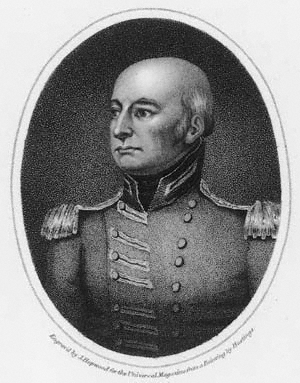John Whitelocke
British Army officer and colonial administrator (1757–1833) From Wikipedia, the free encyclopedia
John Whitelocke (1757 – 23 October 1833) was a British Army officer and colonial administrator. He is known for leading the failed invasion of Buenos Aires and the forfeit of Montevideo to the Spanish by way of treaty.
John Whitelocke | |
|---|---|
 John Whitelocke, Published in 1808 | |
| Born | 1757 |
| Died | 23 October 1833 Hall Barn Park, Beaconsfield, Buckinghamshire |
| Buried | |
| Allegiance | United Kingdom |
| Service | British Army |
| Years of service | 1778–1808 |
| Rank | Lieutenant General |
| Battles / wars | British invasions of the Río de la Plata |
Military career
Summarize
Perspective
Educated at Marlborough Grammar School and at Lewis Lochée's military academy in Chelsea, Whitelocke entered the army in 1778 and served in Jamaica and in San Domingo.[1] He was appointed Lieutenant-Governor of Portsmouth and General Officer Commanding South-West District on 25 June 1799,[2] commanding the garrison during the height of invasion scares in Britain. On 10 November 1804 he was made a lieutenant-general and inspector-general of recruiting,[3] during a period of significant expansion of the British Army. In 1807 he was appointed to command an expedition to seize Buenos Aires from the Spanish Empire, which was in disarray due to events in Europe.[4] The attack failed and the British surrendered after suffering "the lamentable loss of a great proportion of the gallant army engaged in it."[5] Whitelocke undertook negotiations with the opposing general, Santiago de Liniers, and having decided that the British position was untenable, signed the surrender and ordered the British forces to abandon Montevideo and return home later that year.

Chelsea College, Jan.28th 1808
- a contemporary illustration by an anonymous hand
This proceeding was regarded with great disfavour by many under his command and the British Army and public, and its author was brought before a court-martial[4] convened at The Royal Hospital in London in 1808.[6] According to the judge-advocate presiding over the case, Whitelocke not only failed his objective of "the reduction of the province of Buenos Ayres," but also defeated the British hopes of "discovering new markets..., of giving a wider scope to the spirit and enterprise of our merchants, of opening new sources of treasure, and new fields for exertion in supplying either the rude wants of countries emerging from barbarism, or the artificial and increasing demands of luxury and refinement, in those remote quarters of the globe."[5] On all the charges, except one, he was found guilty and he was dismissed from the service.[4] He lived in retirement until his death at Hall Barn Park, Beaconsfield, Buckinghamshire on 23 October 1833.
Notes
References
Wikiwand - on
Seamless Wikipedia browsing. On steroids.
